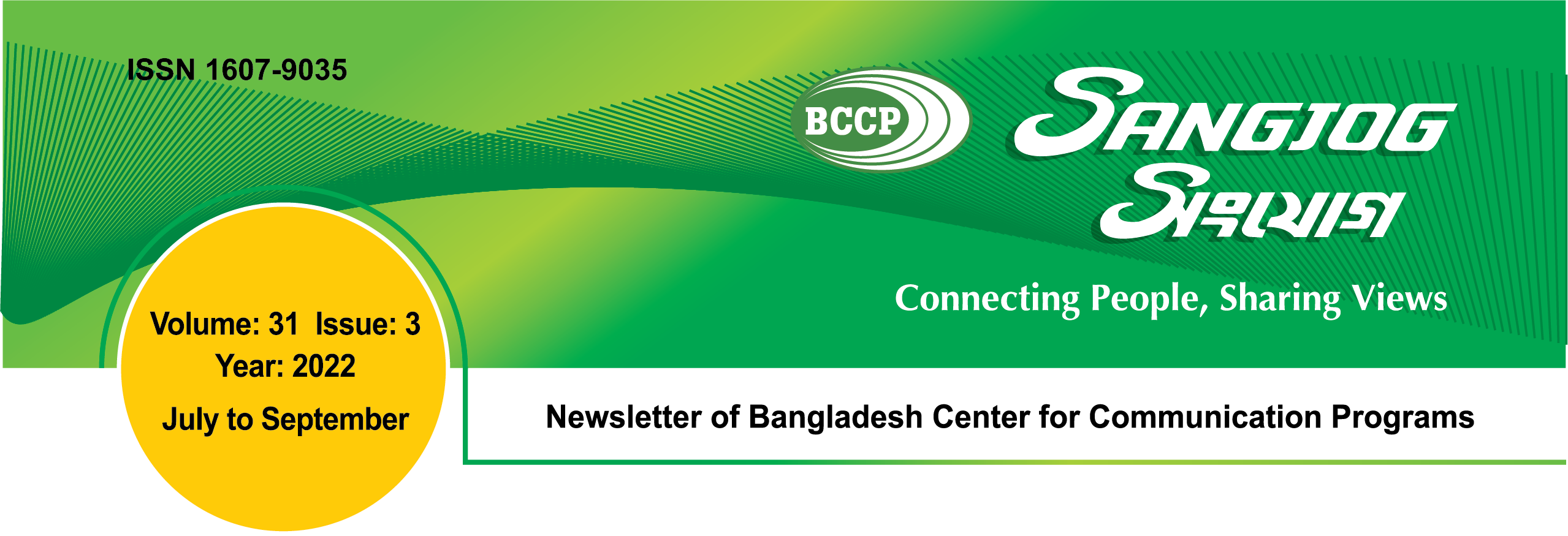
QUALITY COST LESS
Main Article
Importance of Renewable Energy and Energy Efficiency : peoples awareness and engagement is need of time
Dr. Shahida HaqueAdviser (Research & Evaluation); Research Design, Program Evaluation and Result Dissemination
The Sustainable Development Goal # 7 (SDG 7) focuses on affordable and clean energy and the net-zero emissions by 2050. Renewable energy and energy efficiency are critical to attaining this goal. A well-established energy system is necessary to support all sectors: business, health, education, agriculture, infrastructure, communications, and technology (IISD Earth Negotiations Bulletin).
Renewable energy is ‘energy derived from natural sources that are replenished at a higher rate than they are consumed’ (United Nations). Renewable energy sources provided by the sun, wind, water, waste, and heat from the Earth are available in abundance all around us and are constantly being replenished by nature; and emit little to no greenhouse gases or pollutants into the air. On the other hand, non-renewable resources of energy are Fossil fuels - coal, oil and gas - that take hundreds of millions of years to form; and when burned to produce energy these cause harmful greenhouse gas emissions leading to negative impacts on human health and the environment.
Energy efficiency is the ‘use of less energy to perform the same task or produce the same result’ . Energy efficiency is one of the easiest and most cost-effective ways to combat climate change, reduce energy costs for consumers, and is a vital component in achieving net-zero emissions of carbon dioxide (US Office of Energy Efficiency & Renewable Energy).
Health Benefits
According to the World Health Organization (WHO), about 99 percent of people in the world breathe air that exceeds air quality limits and threatens their health, and more than 13 million deaths around the world each year are due to avoidable environmental causes, including air pollution. In Bangladesh more than 100,000 people die every year because of indoor air pollution (World Bank Data, 2018). Switching to clean sources of energy, such as wind and solar, thus helps address not only climate change but also air pollution and health issues.
In 2018, air pollution from fossil fuels caused $2.9 trillion in health and economic costs, about $8 billion a day (Yale School of the Environment). Reducing the use of fossil fuel and transforming to clean energy from renewable resources results in cleaner air, water, and land. In turn, all of these directly benefit human health and reduce the needless expenditures on ill health.
Cost Savings
Solar panels top the list of the most popular alternative sources of energy that can be used as a better source of electricity. Energy-efficient LED light bulbs can produce the same amount of light as incandescent light bulbs by using 75 to 80 percent less electricity.
About $ 5.9 trillion was spent on subsidizing the fossil fuel industry in 2020; roughly $11 million every minute (International Monetary Fund Analysis Report).
In comparison, about $4 trillion a year needs to be invested in renewable energy until 2030 – including investments in technology and infrastructure – to allow us to reach net-zero emissions by 2050.
Bangladesh Profile and Actions
Bangladesh has achieved significant economic growth in recent years. Currently, the demand for energy is growing at a very high rate. Developing sustainable, reliable, efficient and decentralized energy services based on renewable resources is therefore critical to reducing poverty, improving public health and protecting the environment (REEEP, GIZ).
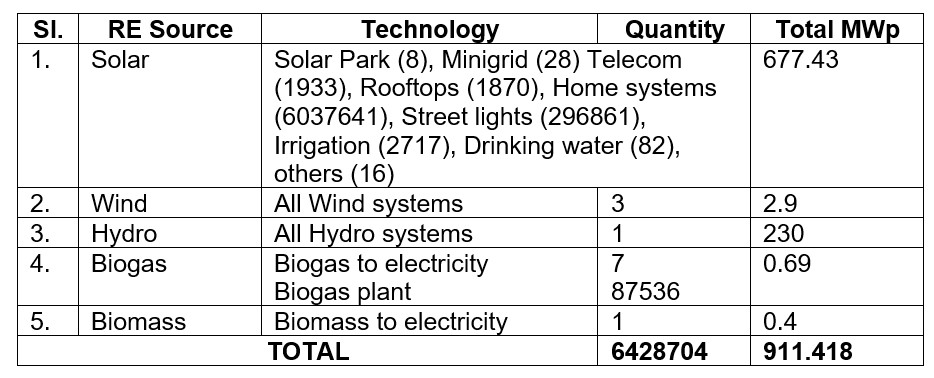
Source: SREDA Official website
Role of Strategic Communication
Social and Behavior Change Communication (SBCC) is essential to build support for Renewable Energy and Energy Efficiency actions; bringing together stakeholders from the government, civil society, business and industrial institutions, private sector and the general public; and changing peoples’ behaviors for use of clean energy.
Under the leadership of SREDA and in partnership by several actors, a national target-group-specific awareness-raising campaign for sustainable use of energy at the end consumer level has been implemented in Bangladesh, with an intended outreach of approximately 1,000,000 persons.
The Campaign endline survey report (January 2022) of total 450 direct and indirect beneficiaries from five categories viz. Residential, Commercial, Industrial, Students and Utility Engineers, found that around 60% respondents know about Renewable energy, Rooftop Solar, Energy efficiency and Energy savings but were less knowledgeable about clean cooking solution, solar irrigation and other RE & EE concepts.
Among the respondents, 44% had participated in any awareness event on solar energy, energy saving or utilization of household electricity and 50% had attended a training or workshop program on these issues. It was found that 36% and 32% of the respondents received social media content and training/workshop module, respectively.
Way Forward
The Survey results show that more needs to be done for sustainable use of energy at the end consumer level. The overall strategic approach should include:
- Encouraging audiences through stages of awareness, knowledge, intention, adoption, and finally to sustained behavior change.
- Sharing important information with ‘personal relevance’ to the specific audiences, and their family and communities, to increase awareness and knowledge of behaviors and practices related to Renewable Energy and Energy Efficiency.
- Employing appropriate and effective communication that ‘caters to the heart and head’ focusing on the benefits directly or indirectly related to the target audiences and the community for motivation towards beneficial Renewable Energy and Energy Efficiency practices.
- Empowering people with skills and supporting their ‘ability to act’ and adopt advantageous use of Renewable Energy and Energy Efficiency related behaviors for their families, communities, organizations and businesses.
- Fostering an enabling social and community environment through community engagement and endorsement by the influential community/business leaders and civil society to promote and expand the use of Renewable Energy and Energy Efficiency in homes and business/industrial organizations.
- Ensuring the provision of necessary support and services at all levels for the specific audiences to adopt and sustain positive behaviors related to use of Renewable Energy and Energy Efficiency. Utilizing an effective mix of general and targeted mass communications, advocacy, community mobilization, policy dialogue and social messaging to reach diverse groups of audiences at the local and national levels.
It is crucial to plan and implement a comprehensive, well-coordinated SBCC campaign targeting consumers as the primary audience; but with equal focus on the secondary audiences including all stakeholders and decision-makers who can help to motivate and sustain the use of renewable resources and energy efficiency at all levels.
An exclusive interview with the national energy expert
Prof. Dr. M Shamsul Alam,
Dean, Engineering Faculty, Daffodil International University, Bangladesh
and
Energy Advisor, Consumers Association of Bangladesh
Interviewer: Mr. Rasheduzzamanm
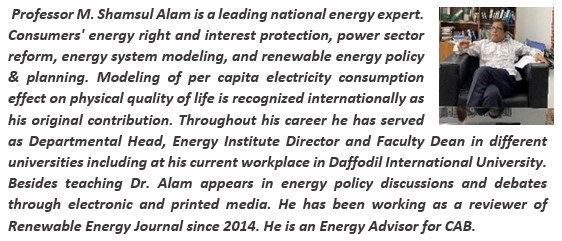 Rashed: Energy source diversification has become demand of time for the countries like Bangladesh. How much we could have achieved it?
Rashed: Energy source diversification has become demand of time for the countries like Bangladesh. How much we could have achieved it?
Prof. Alam: Diversification has happened. However, the merit-based plan did not go according to plan. The Perspective Plan 2010 has clearly stated that no additional electricity will be produced from fuel oil in the future. Incremental power will be generated from own coal and/or imported coal. According to the Renewable Energy Policy 2008, renewable power generation will also increase. However, in order to increase the reserves, gas exploration was urged, and in order to maintain the multipurpose use of gas in the long term, it is said that electricity production from gas will not be increased. In this way, it is proposed to add 500 MW electricity to the grid every year to meet the increasing electricity demand. However, the power and energy sector has not developed as per the diversification proposed in the perspective plan. Diversification was primarily dependent on imported carbon-rich fossil fuels diesel, furnace oil and LNG; Which has threatened the power and energy sector. Neighboring India has almost shifted electricity generation from oil, while we had the exact opposite. Whereas it wasn't meant to be.
Rashed: What is the importance of renewable energy in Power Sector Master Plan-2016?
Prof. Alam: The Perspective Plan 2010 proposed energy source diversification, the Renewable Energy Policy 2008 expected 10 percent of total electricity generation from renewables by 2021, and the Power Sector Master Plan 2016 also highlighted it. Nowhere in this plan has it been said that electricity should be provided to every house with grid electricity. Such a situation becomes a major obstacle in the development and growth of the solar power market. The Perspective Plan does not claim to solve all crises overnight. It did not say about the rental or quick rental is needed to produce electricity. The sustainable solution that has been talked about through the crisis, but no initiative has been taken from the administrative side of the government. As a result, the development of the power and energy sector was not sustainable as it was not in accordance with any policy or plan. Power Sector Master Plan 2016 emphasizes on renewable energy but what is the current scenario? In the 2021 report, the power department said, the contribution of renewable energy to power generation is 0.59 percent, not even 1 percent. If 10 percent of electricity generation were from renewables today, instead of 18 percent, electricity generation would have to be reduced by 8 percent, and not have to deal with such severe load shedding.
Rashed: Will the ambitious plan to shift from fossil fuels to 20% renewable energy by 2030 be achievable?
Prof. Alam: By 2021, 10 percent of electricity was to be generated from renewable fuels. That was our policy obligation. To fulfill this obligation, there should be plans, investment resources, and a skilled technical workforce. Then an implementation plan was needed. The investment also had to have a timeframe. There was none of it. As a result, achieving the target of 10 percent is now an abysmal failure. Therefore, the consequences of achieving the 20 percent electricity generation target from renewable energy by 2030 are bound to be the same, unless the aforementioned conditions are met.
Rashed: SREDA is working to promote this sector by creating a market, will it contribute?
Prof. Alam: If the policy is fulfilled, the expansion will rise gradually. Where that is not fulfilled, what is the basis of all this talk about SREDA? SREDA operates as a sister concern of IDCOL. It has no regulatory powers. As a result, it has no control over companies like IDCOL.
Actually, solar energy market is not being developed in Bangladesh. In this case, IDCOL is a lending company but regulates SREDA. Prepares plans, designs and specifications for solar power plant entrepreneurs and also regulates the product market of solar power plants and pricing of solar electricity at the consumer level. As a result, off-grid solar system technology could not be successful in Bangladesh due to low quality high-cost solar system development. Again, the grid solar power market is also a victim of oligopoly. In 2021, my university received a proposal from several private sector investors to install a solar plant with a production capacity of 500 KW on BOOT basis, on the condition of providing land and purchasing electricity for the plant at the rate of 7 taka. If the market is a level playing field for investors, this approach can lead to solar energy market development without the involvement of SREDA and IDCOL. All these private sector investors are now entering the solar power market. But the fossil fuel power business will be a major obstacle to that market expansion, they will create policy constraints.
But the government is buying the electricity generated from imported diesel, furnace oil, and LNG at higher prices and due to financial crisis, the government is keeping the countrymen in load-shedding as they are not able to generate electricity as per demand despite having sufficient production capacity in both private and public sector. Such a situation could not create an optimal opportunity to create a solar energy market.
Rashed: What is the possibility of solar energy development in Bangladesh? What steps do you think should be taken to achieve the target of 10% of total electricity generation from renewable energy as per the government plan?
Prof. Alam: There should be specific policies and plans for the expansion of renewable energy such as in Gujarat, India. The solar power is cultivated there along with other crops on the farmland. That electricity runs irrigation and is bought by the government and fed into the grid. Under the said power generation policy, an opportunity has been created for farmers to generate 0.5-5 MW of solar power along with crops on agricultural land. It has opportunities for government financial incentives and grants. Gas development funds are formed by consumers with their own money to explore and produce their own gas at low cost. However, that fund formation was not fruitful. Steps taken to achieve the electricity generation target from renewable energy may be:
Firstly, initiatives like Gujarat can be taken to attract small and medium investors to create a portable power market from solar power. Small-scale off-grid power supply systems can also be covered under this initiative.
Secondly, captive generators and IPSs can also be periodically replaced by solar sources.
Thirdly, solar power development fund can be formed with domestic and foreign support along with CSR fund of various companies. Solar power market will automatically be created if young entrepreneurs are supported to develop solar energy sector at low interest rate (less than 3 percent) from that fund.
Fourthly, as the fuel used in rural transport has been replaced by electricity, there has already been a radical change in the communication system. Installing solar power charging stations for these transports at road junctions will on the one hand reduce grid power demand, on the other hand reduce government subsidy on wholesale power for REBs and reduce the risk of grid failure.
Fifth, solar power usage targets (3-10 percent) can be set for industrial, commercial, residential customers, and concessional tariff benefits can be given to customers who achieve the target. If necessary, VAT and corporate tax can be reduced.
If the above measures are adopted, there will be a large number of employments in the private sector, which is called green job creation.
Rashed: So, what is the main challenge?
Prof. Alam: The main challenge is that the renewable energy sector is largely controlled by fossil fuel-based power traders and the sector is uncompetitive and suffers from an oligopoly created by them. Along with this electricity business, the development of renewable energy or solar electricity market is a threat to that business. If that threat is not regulated or mitigated by government authority and government, the market for renewable electricity will not develop.
Rashed: SREDA and various distribution agencies are working on energy efficiency? Will it reduce stress on the grid?
Prof. Alam: You see, behavior change does not happen suddenly, there has to be a gain, an incentive for the behavior changer. I went to see their energy transition at the invitation of the German government. One of my students came to visit me at Hamburg. She had a bottle of water in his hand and after drinking the water I saw he put the empty bottle in her bag. He picked up a few more empty bottles nearby and put them in her bag. I asked in surprise, “there is no water why are you taking an empty bottle? She said, “Sir, if I deposit empty bottles, it is twenty-five cents per bottle I will get.” There has to be some kind of incentive behind what you want to do.
In the case of Bangladesh, convincing people to use electricity efficiently has not been effective, and people do not change their natural behavior unless they see the benefits. There are many opportunities to work here. Much of the existing electricity shortage can be filled in by changing electricity consumption behavior by reducing demand.
Rashed: Thank you sir for your valuable time to provide us with your thoughts and suggestion on this most important issue of the current time.
Prof. Alam: Thank you very much too.
N.B. The opinions expressed here is exclusively holds by the interviewee. It does not reflect opinion of BCCP.
BCCP News
“Climate Change” became another diversified work arena of BCCP: a training module on way of development
BCCP has further broaden its working arena with developing a training module on Climate Change. Under a WHO awards BCCP undertaken developing this training module targeted for two types of audiences as; central level officials of units under the Directorate of Health and the District & Upazila level Health Program Manager includes Civil Surgeon and Upazila Health and Family Planning Officer.
This training module has been introduced with 13 broad contents as;
- Basics on climate change
- Climate change and Bangladesh perspective
- Climate change and health burden
- Extreme weather
- Vector-borne diseases and climate change
- Water-borne diseases and climate change
- Food security and malnutrition
- Air pollution
- Assessing health vulnerability
- Adaptation and Mitigation to climate change
- Management and challenges to meet the health outcome
- Community engagement and community-based adaptation
- Group work on assessing different type of vulnerabilities and risk assessment due to climate change
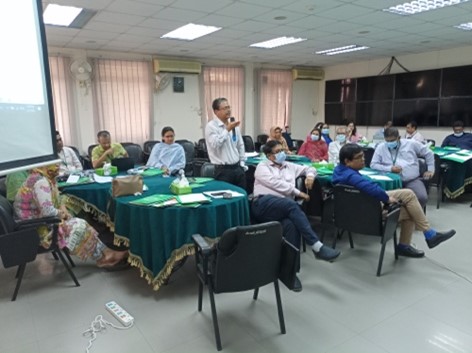
- Training Needs Assessment
- Desk review and situation analysis
- Content development workshop
- Development of the draft module.
The participants of the workshop worked in three groups and thoroughly review the training module. The key group recommendation to include in to the module found by the groups are as below:
- All reference books or materials links has to be inserted at the end of the related session
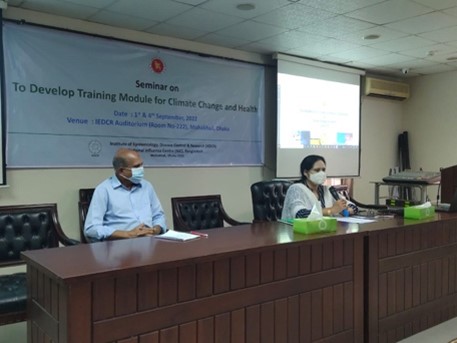 - The drought issue should be brought as one of the key impacted area of Climate Change
- The drought issue should be brought as one of the key impacted area of Climate Change- Elaborative description as trainers note could have been shortened
- Country context as described in the GoB document has to be taken into consideration for inclusion
- Adding climate projection as part of Climate Change
- Lightening, cold wave and hit wave could have been brought as adverse impact of Climate Change.
A brief closing session of the workshop was held with the presence of Prof. Dr. Tahmina Shirin, Director-IEDCR. In her closing speech Prof. Dr. Tahmina underscored the Risk Communication and Community Engagement (RCCE) as best prevention measure for combatting the adverse impact of Climate Change. She hoped that this module will profusely contributing towards skill development and roles to play of the health program managers.
BCCP actions on Climate Change initiated with rolling out the introduction of training manual on “Climate Change and Health” for the central level trainers
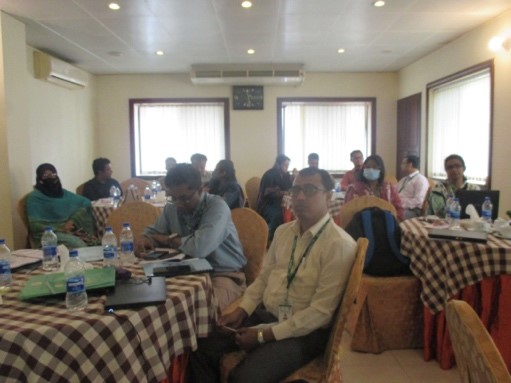 Following the multi-step process oriented manual development phase, the training manual on “Climate Change and Health” has now entered to its implementation level with the holding of Training of Training of Trainers (ToT) for the members of central level training pool. This stage of actions will bring up the Climate Change initiative with the field level implementation of the upazila level field officials to connect with the community level mobilization, their engagements and participation to act on the mitigation and adaptation of the Climate Change effect. The whole activity of development of training manual and the training programs is being financed by the World Health Organization (WHO)-Dhaka.
Following the multi-step process oriented manual development phase, the training manual on “Climate Change and Health” has now entered to its implementation level with the holding of Training of Training of Trainers (ToT) for the members of central level training pool. This stage of actions will bring up the Climate Change initiative with the field level implementation of the upazila level field officials to connect with the community level mobilization, their engagements and participation to act on the mitigation and adaptation of the Climate Change effect. The whole activity of development of training manual and the training programs is being financed by the World Health Organization (WHO)-Dhaka.
This 3-day ToT was held on September 25-27 at a local hotel in Dhaka that was participated by 20 officials represents IEDCR, NCDC and NIPSOM of the DGHS whom all are having with medical backgrounds. The training manual has 11 sessions for the ToT while the field level training is having 13 sessions. The short introduction of these sessions are:
- Basics on climate change
- Climate change and Bangladesh perspective
- Climate change and health burden
- Extreme weather
- Vector-borne diseases and climate change
- Water-borne diseases and climate change
- Food security and malnutrition
- Air pollution
- Assessing health vulnerability
- Adaptation and Mitigation to climate change
- Management and challenges to meet the health outcome
- Community engagement and community-based adaptation
- Group work on assessing different type of vulnerabilities and risk assessment due to climate change
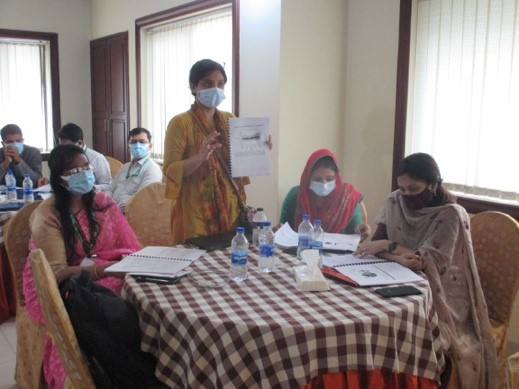 A combined form of methodologies was followed in planning, organizing and conduction of the ToT and facilitating sessions that followed the Reflection, Discussion and Synthesis model of training which includes;
A combined form of methodologies was followed in planning, organizing and conduction of the ToT and facilitating sessions that followed the Reflection, Discussion and Synthesis model of training which includes;- Plenary discussion with question and answer
- Group work and group presentation
- Visualized and video presentation
- Worksheet exercise
- Quality presentation exercise and making mock presentation in group.
In the opening and closing sessions Prof. Dr. Tahmina Shirin, Director, IEDCR attended as Chief Guest and spoke on the occasion. In her closing remarks she particularly recommended to concentrate more on the necessity of community preparedness and termed this training manual and the following training programs as a good additions and effort for health sector’s effect of climate change and that for the community-based mitigation and adaptation plan.
Happy time in sports may be a useful technic to aware the Children to use the service facilities with care: an initiative undertaken in the Rohingya camps by BCCP
Depending on age, and stage of development, children simply may not have the language skills like adults, so there is a bit of a communication gap between children and adults. They may feel something, but in many cases, they either can’t expresses it to an adult or do not find trusted adult to express it to. In the case of Displaced Rohingya People (DRP) this reality created a triangular communication gap between ‘child-adult within DRP & host/Bangladeshi service provider’.
Children learn to understand the world and its place in it through play. It’s where they’re free to act out their inner feelings and deepest emotions.
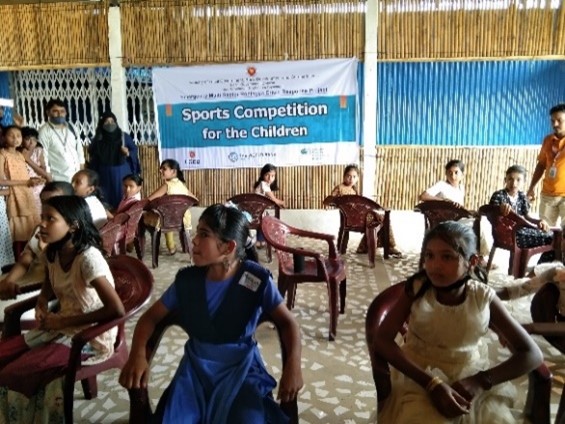
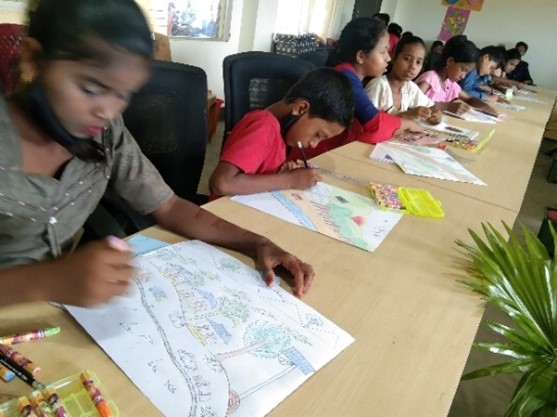
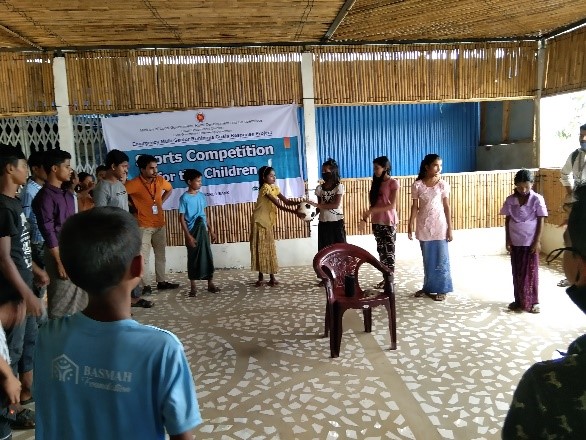
The main objective of this event was to disseminate information about EMCRP services to the DRP Children, their family members, and teachers and encourage them to best use of the services. The sessions were designed in an interactive manner having questions answers, brainstorming by involving the children in:
- Pillow passing
- Chair seating
- Ball throwing in the basket
- Drawing of EMCRP service facilities (solar lights, roads, drain, water tap stand, etc.)
Camp In-Charge (Executive Magistrate) of the concerned camps was present as chief guest and Assistant Camp In-Charge was present as special guest.
Play is of vital importance for the healthy development of children. From a developmental perspective, the play offers ample physical, emotional, cognitive, and social benefits. It allows children and adolescents to develop their skills, experiment with their (social) behavioral range, simulate alternative scenarios, and address the various positive and negative consequences of their behavior in a safe and engaging context.
A new horizon has been opened up with the initiation of “Bangladesh Socio Behavioral Survey on Health, Population and Nutrition
It has become an epoch-making initiative and a new horizon have been opened up with the initiation of “Bangladesh Socio Behavioral Survey on Health, Population and Nutrition. This initiation has been generated with the holding of a 2-day long workshop held in a hotel in Cox’s bazar on 27-28 August 2022.
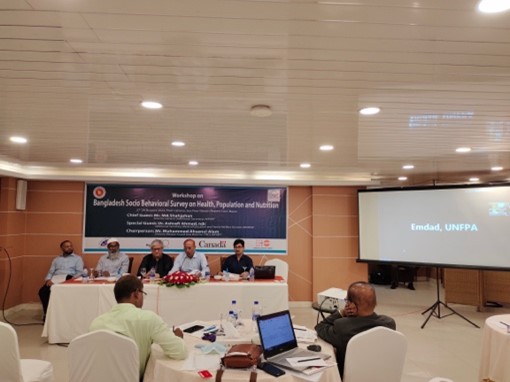 A varied level of decision makers, social scientist, demographer, health statistician, program designers & implementors and development partners took part in this workshop to provide program inputs, formation of research structures and decision making over the conduction of the survey has formally created the path of bringing two-year’s effort of Ujjiban-BCCP team in to a reality.
A varied level of decision makers, social scientist, demographer, health statistician, program designers & implementors and development partners took part in this workshop to provide program inputs, formation of research structures and decision making over the conduction of the survey has formally created the path of bringing two-year’s effort of Ujjiban-BCCP team in to a reality.
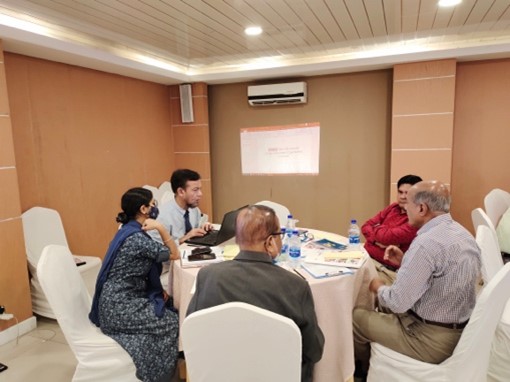 In his inaugural speech Mr. Mohammad Shahjahan, DG-NIPORT underscored the importance of SBCC in HPN program implementation and he termed this proposed study as a great opportunity to know the behavior traits at the household levels and its impact on receipts of HPN services. Mr. Ahsanul Alam, Director (Research)-NIPORT remarked as Chairperson of this session that this survey will add to the Bangladesh’s demographic scenario of the HPN fields in addition to the BDHS. He thanked Ujjiban for their initiatives and pursuance with this effort to bring up to this stage of the successes. He also thanked UNFPA for their financial support in this initiative to continue the effort.
In his inaugural speech Mr. Mohammad Shahjahan, DG-NIPORT underscored the importance of SBCC in HPN program implementation and he termed this proposed study as a great opportunity to know the behavior traits at the household levels and its impact on receipts of HPN services. Mr. Ahsanul Alam, Director (Research)-NIPORT remarked as Chairperson of this session that this survey will add to the Bangladesh’s demographic scenario of the HPN fields in addition to the BDHS. He thanked Ujjiban for their initiatives and pursuance with this effort to bring up to this stage of the successes. He also thanked UNFPA for their financial support in this initiative to continue the effort.
The workshop went through working in groups in three key areas of the survey and make presentation of the group work in the plenary. Three key areas of group work are as below:
Group A: Survey Methodology, Sample Population, Sampling Frame Indicators and Variables
Group B: Data Collection Instrument (Quantitative)
Group C: Data Collection Instrument (Qualitative)
The group work on the data collections instrument has recommended following seven key HPN service domains and four cross-cutting as:

The concluding session of workshop was attended by the Mr. Mohammad Shahjahan, DG-NIPORT and Dr. Ashrafi Ahmed, Additional Secretary, ME&FWD, MoHFW. The DG-NIPORT reiterated his prior plan to fund for this study from NIPORT budget and undertake immediate actions following this workshop to accomplish the whole gamut of the study within December 2022.
Consultative Meeting to Identify the
Future Tobacco Control Research Needs in Bangladesh Held
Bangladesh Center for Communication Programs (BCCP) in collaboration with the National Tobacco Control Cell (NTCC) and Bangladesh Tobacco Control Research Network (BTCRN) organized a Consultative Meeting to Identify the Future Tobacco Control Research Needs in Bangladesh on August 17, 2022, at BMA Bhaban, Dhaka. The purpose of the meeting was to identify research themes to develop a Call for a Proposal for the 2023 Tobacco Control Policy Research Grant Program.
While the Ministry of Health and Family Welfare is working to make another law amendment considering several key issues like banning E-cigarette, stopping the selling of single cigarette
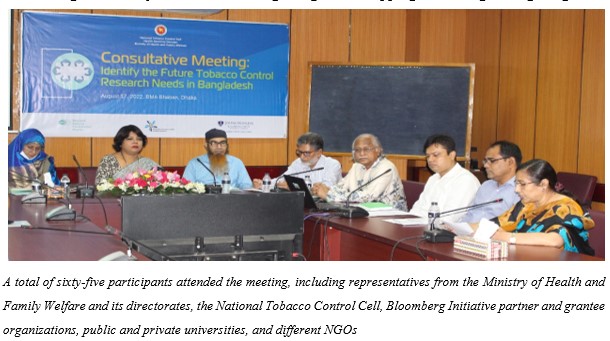
Kazi Zebunnessa Begum, Additional Secretary (WH Wing), Health Services Division, Ministry of Health and Family Welfare attended the meeting as the Chief Guest. Mr. Hossain Ali Khondoker, Coordinator (Additional Secretary), NTCC; Prof. Shah Monir Hossain, former Director General, DGHS; Mr. Shafiqul Islam, Head of Programs, Vital Strategies
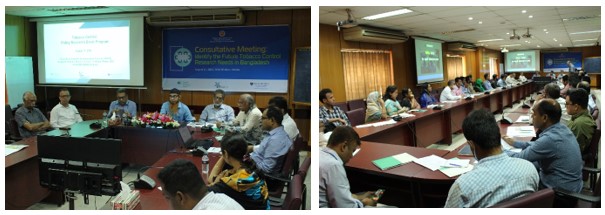
Dr. Zeenat Sultana, Program Director, BCCP initiated the meeting by welcoming the participants. She briefly mentioned the objectives of implementing the Tobacco Control Policy Research Grant Program and organizing this Consultative Meeting. Mr. Mohammad Shamimul Islam, Team Leader, JHSPH-BCCP Tobacco Control Program, presented the objectives, implementation processes, outcomes, and sustainability of the Tobacco Control Policy Research Grant Program.
The Tobacco Control Policy Research Grant Program considers proposals on the WHO MPOWER package. Hence, Dr. Syed Mahfuzul Huq, National Professional Officer, WHO Bangladesh, presented "WHO MPOWER" to familiarize the participants with the different components of MPOWER. He explained it as provided below with some examples for each component: M- Monitoring tobacco use
P- Protecting people from tobacco smoke
O- Offer help to quit tobacco
W- Warning about the danger of tobacco
E- Enforcing the tobacco advertisement, promotion, and sponsorship bans
R- Raise taxes on tobacco
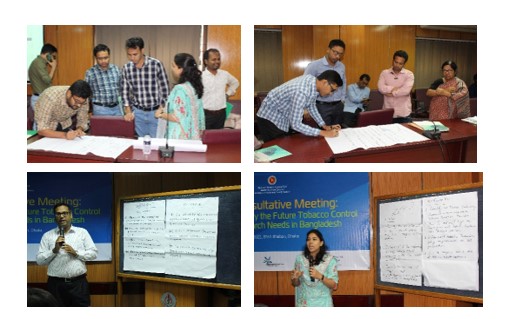
Tobacco Control Policy Research Grant Program: Review the Research Recommendations and Identify Actions
A workshop on Journey Towards Generating Local Evidence: Review Recommendations and Identify Actions was held to review the recommendations of all 104 studies conducted as of 2021. Bangladesh Tobacco Control Research Network (BTCRN) organized the workshop with technical assistance from the Bangladesh Center for Communication Programs (BCCP) on September 21, 2022, at the CIRDAP Auditorium, Topkhana Road, Dhaka. These tobacco control studies were carried out by academics, researchers, tobacco control advocates, and students with funding assistance from the Bloomberg Initiative. Participants from diverse backgrounds, including government agencies, non-governmental organizations, academics, researchers, and students, participated in this workshop to identify some critically important activities to reduce tobacco consumption in accordance with existing laws and proposed law amendments.
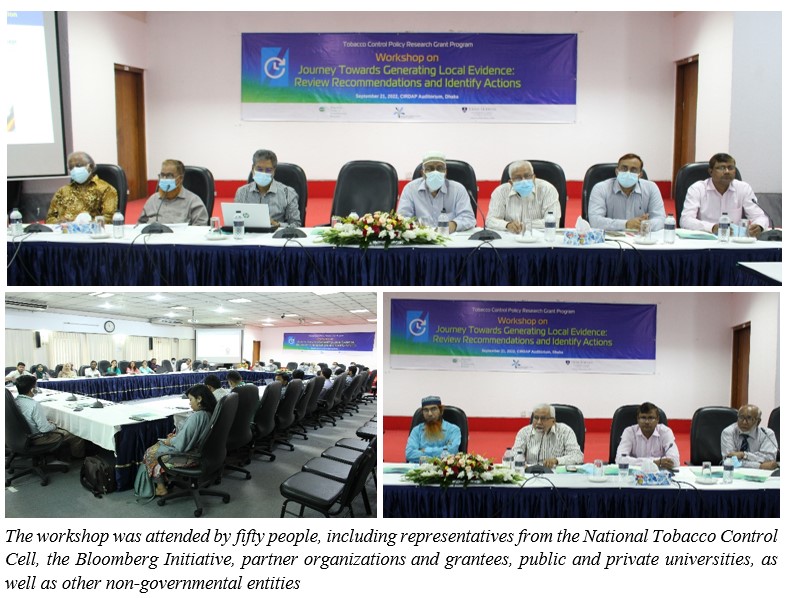

Health and Family Planning programs require adapting SBCC as their mainstream program intervention
- Mr. Syed Mojibul Huq, Additional Secretary, HSD of MoHFW
An active and widespread participation marked the 5th meeting of the National Committee on HPN SBCC Strategy Implementation and Monitoring was held on August 08, 2022 in the conference room of the MoHFW. As part of Ujjiban activities the BCCP team facilitated organizing this workshop that was participated by 17 members of this committee in which BCCP had a duel participation through Ujjiban as partner organization and BCCP by virtue of their organizational membership.
 Senior officials of the ministries and the directorates include; Joint Secretary, LGD of the MoLGRD; Joint Secretary, ME&FWD, MoHFW; Director-IEM, Director-MCH, Line Director-NNS, Line Director-IEC, Chief-HEB, DPM-EPI, DPM-CCSDP and TSE-HSD, MoHFW. Mr. M Jashimuddin Khan, DS, PH-2, HSD of the MoHFW hosted the meeting while Mr. Syed Mojibul Huq, Additional Secretary, HSD of MoHFW presided over the meeting.
Senior officials of the ministries and the directorates include; Joint Secretary, LGD of the MoLGRD; Joint Secretary, ME&FWD, MoHFW; Director-IEM, Director-MCH, Line Director-NNS, Line Director-IEC, Chief-HEB, DPM-EPI, DPM-CCSDP and TSE-HSD, MoHFW. Mr. M Jashimuddin Khan, DS, PH-2, HSD of the MoHFW hosted the meeting while Mr. Syed Mojibul Huq, Additional Secretary, HSD of MoHFW presided over the meeting.
The active participation of attendee members contributed to come-up with following key decisions include:
- Inter-OP coordination requires putting further emphasis to optimize resource utilization.
- Timely submission and approval of the SBCC materials by the HPN units to be made within the stipulated timeframe.
- Activation of HPN SBCC committees at district and upazila level is the demand of time requires follow on by the Directorates/units.
- The IEM and L&HEP unit require expediating implementation/conduction of the Leadership and Coordination training and to report to the next meeting of this committee about the progresses.
 - Implementation of SHPNE package is going well with the DGFP/IEM unit while there were no progresses with the DGHS/HEB units. Requests made to them that they would report about the progresses in the next meeting of this committee.
- Implementation of SHPNE package is going well with the DGFP/IEM unit while there were no progresses with the DGHS/HEB units. Requests made to them that they would report about the progresses in the next meeting of this committee.
The Chairperson of the meeting pointed out few important considerations to get self-absorbed and bring its reflection in our program implementation. His key points include;
- As GoB’s activity implementation system has been changed that require momentum and dynamism in program implementation.
- Our SBCC material require adopting modern technology to acquire extended audience attention.
- As a larger number of audiences is now accessing to social media we should emphasize message/material dissemination using this media platform.
He concluded the meeting remarking that “SBCC has to be considered as steering wheel for program promotion and health & family planning programs require adapting SBCC as their mainstream program intervention”.
BCCP and BUHS has Signed an MOU to offer a joint academic short course on “Strategic Communication in Health and Social Development”
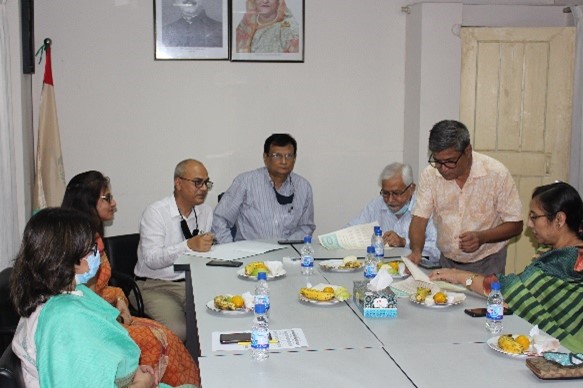 Bangladesh Center for Communication Programs (BCCP) and the Bangladesh University of Health Sciences (BUHS) is working together to offer a joint short course on “Strategic Communication in Health and Social Development”. BUHS will introduce this as part of their regular academic course under the Department of Health Promotion and Health Education, Faculty of Public Health. Whilst BCCP will develop the course module along with its contents and topics. The course materials will also be developed by BCCP for handing it out to the course attendees.
Bangladesh Center for Communication Programs (BCCP) and the Bangladesh University of Health Sciences (BUHS) is working together to offer a joint short course on “Strategic Communication in Health and Social Development”. BUHS will introduce this as part of their regular academic course under the Department of Health Promotion and Health Education, Faculty of Public Health. Whilst BCCP will develop the course module along with its contents and topics. The course materials will also be developed by BCCP for handing it out to the course attendees.
This is a three-credit course which has been planned to be provided in a total of 16 educational topics, in a span of a total of 60 hours’ time to spread through a total of 40 sessions in which 20 will be didactic with equal number of practical sessions. Each session will be 90 minutes long and will be conducted during the weekends in 3 months-time.
The signing ceremony of the Memorandum of Understanding (MoU) was taken place on August 10, 2022 in the conference room of BUHS in presence of the senior officials of BUHS and BCCP. Prof (Dr.) Faridul Alam, Vice-Chancellor BUHS and Mr. Mohammad Shahjahan, Director and CEO, BCCP also attended this event and spoke on the occasion.
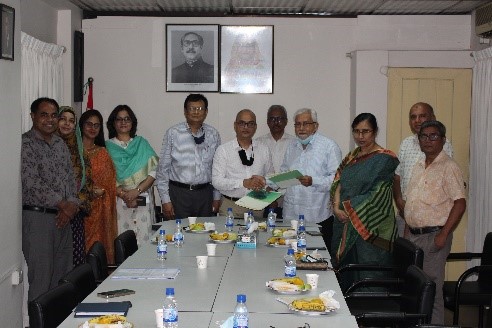 In his speech Prof (Dr.) Faridul Alam expressed his high satisfaction and hopefulness about the introduction of this course amid growing demand and necessity of public health awareness. He hoped that this course will be very effective and beneficial for the public health professionals with the association of BCCP in course designing and conduction. Mr. Mohammad Shahjahan referred the introduction of this course as a remarkable addition in the public health education system of the country and thanked BUHS for their interest and effort in undertaking this initiative. The call for registration into the course will be commenced in the last week of August 2022.
In his speech Prof (Dr.) Faridul Alam expressed his high satisfaction and hopefulness about the introduction of this course amid growing demand and necessity of public health awareness. He hoped that this course will be very effective and beneficial for the public health professionals with the association of BCCP in course designing and conduction. Mr. Mohammad Shahjahan referred the introduction of this course as a remarkable addition in the public health education system of the country and thanked BUHS for their interest and effort in undertaking this initiative. The call for registration into the course will be commenced in the last week of August 2022.
The MoU was jointly signed by Prof. Dr. Md. Anower Hussain, Dean, Faculty of Public Health, BUHS and Mr. Mohammad Shahjahan, Director and CEO, BCCP. While exchanging the signed MoU both of them expressed their high expectation of continuation of this course as a source of combining public health education with social development aspects and bringing it associated with communication with community through various means of strategic communication.
Bangladesh Training & Research Foundation (BTRF) marked its steady progress in last year amid Covid-19 challenges
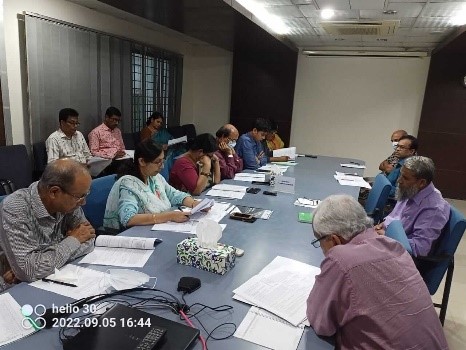 BTRF had marked its steady progress in last year during July 2020-June 2021 that revealed in their Annual General Meeting (AGM) held on September 05, 2022 in which BTRF President Mr. Mahammad Shahjahan attended as Chairperson of the meeting. This achievement has been attained amid people’s fears, mobility restrictions and few other limitations those were statutorily and socially imposed on while Covid-19 was passing through all the devastating periods of its 1st, 2nd and the 3rd wave during BTRF’s reporting period.
BTRF had marked its steady progress in last year during July 2020-June 2021 that revealed in their Annual General Meeting (AGM) held on September 05, 2022 in which BTRF President Mr. Mahammad Shahjahan attended as Chairperson of the meeting. This achievement has been attained amid people’s fears, mobility restrictions and few other limitations those were statutorily and socially imposed on while Covid-19 was passing through all the devastating periods of its 1st, 2nd and the 3rd wave during BTRF’s reporting period.
Attendee members expressed their satisfaction over the pace and volume of the business that BTRF procured and generate revenues during this pandemic period. BTRF’s major business deal made with following consultancies and project work and organizations:
- Handicap International: Conduct a capacity assessment for local partners at Cox’s Bazar
- Partners in Population and Development: Documentation of the best practices
- World Fish: Translation services
- Renting out of the multipurpose hall: 42 days occupancy
- Food and catering services: Continued with these services in spite of various limitations.
With the remission of the effect of Covid-19, BTRF has increased its business aspirations to have higher responses with their services for multipurpose hall and guest room utilization with food and catering services. They also have planned for a 6-month business drive on following businesses:
- Food and catering services to open for staff and other office deliveries
- Organize and conduct regular training courses under pre-set training calendar
- Promote the multipurpose hall and guest room utilization with Dhaka-based NGOs, training organizations and corporate offices
- Market search for new businesses for consultancy services on training and research
- Drive for getting enlisted with GoB, INGO and NGOs for BTRF services on food and catering, multipurpose hall and guest room facilities.
 In his concluding remarks Mr. Mahammad Shahjahan, as Chairperson of the meeting, underscored the need of continuation of ‘Client Oriented’ and demand-based services for BTRF. He mentioned that the sister concerns were established to become effective organs of BCCP contributing to its sustainability in which BTRF is putting their good effort. He expected other sister concerns to come along the way as BTRF is trying to mobilize their effort. He reiterated that BCCP transformation plan has introduced the sister concerns and income generation through them as a one of the five driving domains.
In his concluding remarks Mr. Mahammad Shahjahan, as Chairperson of the meeting, underscored the need of continuation of ‘Client Oriented’ and demand-based services for BTRF. He mentioned that the sister concerns were established to become effective organs of BCCP contributing to its sustainability in which BTRF is putting their good effort. He expected other sister concerns to come along the way as BTRF is trying to mobilize their effort. He reiterated that BCCP transformation plan has introduced the sister concerns and income generation through them as a one of the five driving domains.
BCCP STAR OF THE MONTH

As a strategic communication organization, BCCP evaluates each staff in 360 degree each year. But to promote individual staff’s good work as example and encourage him/her to continue the good work, BCCP initiated recognizing the best performer of the month from July 2020 as “BCCP Star of the Month”. Below is the three BCCP Star of the Month recognized during the July to September 2022 period.
Ms. Zannatul Ferdous, Research Officer, BCCP (July 2022)
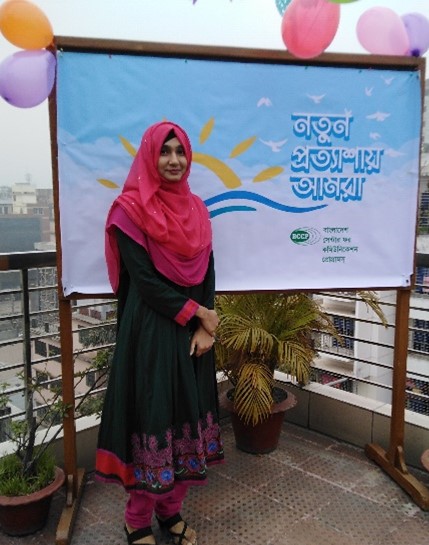 Ms. Zannatul Ferdous accomplished her graduation and post-graduation from the Department of Statistics, University of Dhaka along with excellent academic results. She achieved the most prestigious “Dean’s Award” from the faculty of science for her B.Sc result. During her academic career, she gained a wide range of knowledge about data collection methodologies, data virtualization, and different techniques of data analysis. She is fluent in a number of data management software, such as SPSS, STATA, and Excel. Also, she has a good working knowledge of core programming skills (e.g. R & C) and handling real data. Additionally, Ms. Ferdous was involved in some projects and conducted a thesis on zero-inflated longitudinal count data. She has acquired good command in report writing as well. With this excellent educational qualification that added with dedication in performing job, she created a buzz of good work in BCCP. In her 16 months journey with BCCP she served with the highest quality. Recently, she joined as the Research Officer for the Institute of Health Economics under the University of Dhaka.
Ms. Zannatul Ferdous accomplished her graduation and post-graduation from the Department of Statistics, University of Dhaka along with excellent academic results. She achieved the most prestigious “Dean’s Award” from the faculty of science for her B.Sc result. During her academic career, she gained a wide range of knowledge about data collection methodologies, data virtualization, and different techniques of data analysis. She is fluent in a number of data management software, such as SPSS, STATA, and Excel. Also, she has a good working knowledge of core programming skills (e.g. R & C) and handling real data. Additionally, Ms. Ferdous was involved in some projects and conducted a thesis on zero-inflated longitudinal count data. She has acquired good command in report writing as well. With this excellent educational qualification that added with dedication in performing job, she created a buzz of good work in BCCP. In her 16 months journey with BCCP she served with the highest quality. Recently, she joined as the Research Officer for the Institute of Health Economics under the University of Dhaka.
Editorial
To achieve the SDGs (sustainable development goals) 2030 and progressing towards an advanced country by 2041, Bangladesh requires additional energy utilization but need to keep reduction in CO2 emission. Furthermore, the country is most vulnerable to climate change as well. In this context, renewable energy could be instrumental in sustaining growth as well as safeguarding the environment. We know, we need to increase renewable energy adoptability and capacity to address the climate crisis. We also know that policy support as well as social awareness for renewable energy is at an all-time high.
Renewable energies are one of the most important assets for national and international economies to achieve the 2030 targets. The rapid technological development and expansion of renewable energies in many countries, certainly confirms that renewable energies will be one of the most important actors, economically and environmentally, of our time. However, introduction of new concepts as well as the related technologies is necessarily a social and cultural transformation that implies adaptation to a new context, co-created by the interaction between those intervened and interveners.
Adoption and adaptation to new technologies depends on the characteristics of each community, but it can be enhanced when participation shapes the evolution of the technological intervention, opening up to adversity of expectations associated to the complexity of the system. The key lies in community engagement, defined as “the process of working collaboratively with and through a group of people affiliated by geographic proximity, special interest or similar situations to address issues that affect the well-being of those people”. In this way we not only engage the community in the transition to renewables, but also provide a powerful vehicle for environmental and behavioral change.
However, due to lack of clear information dissemination base on renewable energy and their co-benefits, many people, even some energy professionals, are unconvinced about the prospect of renewable energy. They mostly exaggerate the price of renewable energy and are of the opinion that renewable energy technologies are not mature enough to become viable options. Consequently, negative perception persists over renewable energy, hindering wider deployment. Reliable information and best practices can overturn doubts and show that renewable energy is the promising and sustainable energy option for Bangladesh. Under a comprehensive and strategic communication plan policy level advocacy and mass level campaign can play a vital role for this.
A strategic and comprehensive Social and Behavior Change Communication (SBCC) plan is essential to build support for Renewable Energy and Energy Efficiency actions; bringing together stakeholders from the government, civil society, business and industrial institutions, private sector and the general public; and changing peoples’ behaviors for use of clean energy.
Lancet Article
Scoop News: International Publications
Videos
BCCP PROMOTIONAL VIDEO











































